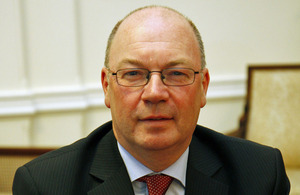Will there finally be an Arms Trade Treaty?
Foreign Office Minister Alistair Burt has a spoken about the need for a strong ATT text that the majority of states can and will implement.

Alistair Burt
Foreign Office Minister Alistair Burt spoke at an event hosted by the Finnish Foreign Minister Erkki Tuomioja with Amnesty International and Saferworld in New York yesterday. Alistair Burt was in New York heading the UK delegation to the UN Arms Trade Treaty conference.
Alistair Burt said:
I’d like to begin by thanking our hosts, Finland for holding this event. As the title of the event suggests, we have all been working on this issue for some time now, we have worked closely together to get to this point, and we are all here because we are committed to securing an Arms Trade Treaty. I personally attended the Conference here last July and I am here again to add my full support to our shared goal of finalising an ATT.
Of course our desire and our efforts towards a Treaty are not new. The UK and Finland as Co-Authors of the Treaty have been working for the past seven years to agree a Treaty. I am optimistic and realistic: we have a good base from which to build following the significant progress of last July and we heard yesterday the strong messages of support for the Treaty and for working towards consensus.
We need to be realistic. A week may be a long time in politics but nine days is a short time for finalising the ATT. There remain a number of significant hurdles to overcome and success is far from guaranteed. States will again need to show their commitment late into the evenings and over weekends to negotiate the strongest possible Treaty with the broadest possible support – which is central to UK’s approach. Campaigners too will need to continue their efforts over the next couple of weeks.
The United Kingdom has said on many occasions that we will not sign a weak Treaty. But we will not allow work towards improvement to unravel what has already been achieved. A perfect piece of paper will not save lives. For this Treaty to be effective, we need to negotiate as if implementation matters. Because it does – it is crucial. We have the opportunity to craft a strong text that the majority of states – including all the major exporters of arms – can and will implement. The ATT needs to apply globally and the major arms exporters of today and tomorrow must be part of it. Together the United States, Russia and China account for over 50% of the international arms trade. We believe therefore that the Treaty needs broad, ideally universal, participation to achieve its full potential: this should be our goal in these negotiations.
Its shape is clear. States with little or no regulation will have to introduce legislation and develop export control mechanisms. And, despite the reservations of a few, it should require all to assess arms exports – including small arms and light weapons, ammunition, parts and components – on the basis of criteria including respect for international humanitarian law and human rights. Where there is an unacceptable risk it should be mandatory to refuse exports.
The human cost of the poorly-regulated trade of arms is still too high. We have a duty to prevent conflict and protect innocent civilians by placing human rights and international humanitarian law at the forefront of globally-agreed standards for the international arms trade. We must also acknowledge the need to protect a legitimate industry. The UK has worked closely with both NGOs and industry, which gives us a particularly strong basis from which to take this work forward. By establishing a baseline for robust controls, we ensure that countries can defend their citizens without undermining human development.
An enormous amount of time has been invested – in capitals and here at the United Nations - by diplomats and campaigners who have spared no effort to fulfil the promise of the first resolution seven years ago.
We are now closer than ever to achieving our aim. As it stands today, the draft Treaty would establish for the first time a legally-binding set of global commitments on national arms export controls. It would require national governments to assess all arms exports against criteria including human rights and to deny an export if it poses unacceptable risks. Authorisations of exports would be reported. Arms brokering would be regulated. The legitimate trade in arms would be protected and international collaboration promoted through the introduction of common international standards.
This is therefore an historic opportunity to conclude a Treaty which will save lives, reduce suffering, promote stability, underpin sustainable development, combat terrorism and crime, and protect the legitimate arms trade. The time is certainly right to get such a treaty agreed and I would like to thank those of you here who have taken us so close to delivering a treaty that will make a real difference.
Further Information
Foreign Secretary William Hague joined Foreign Ministers from six other countries to call for a universal Arms Trade Treaty
Foreign Office Minister Alistair Burt wrote to Amnesty International about the UK’s Governments efforts to secure an Arms Trade Treaty
Read about the Foreign Office’s work countering weapons proliferation
Follow the UK Mission to the United Nations on twitter @UKUN_NewYork